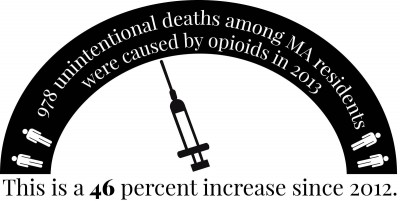Massachusetts Gov. Charlie Baker announced Feb. 19 the establishment of a 16-member Opioid Addiction Working Group of a variety of opioid experts to “ignite conversation” in the hope of reducing opioid addiction rates in the Commonwealth, according to a Feb. 19 press release from the Governor’s office.

“We have brought together a group of individuals from many diverse backgrounds and experiences related to prevention, intervention, treatment, recovery support and law enforcement, who, after holding a listening tour with stakeholders around the Commonwealth, will report back to the administration with specific, targeted and tangible recommendations to increase public awareness about these medications and reduce the rate of addiction,” Baker said in the release.
The Working Group will review resources available to addicts, hold four public events to get community input and submit a list of recommendations to Baker’s office by May, the release stated.
There were approximately 978 unintentional deaths among Massachusetts residents caused by opioid overdoses in 2013, according to a report by the Massachusetts Department of Public Health released Feb. 19. This represents a 46 percent increase from 2012.
Additionally, there are approximately 10,636 individuals with “Activity of Concern,” in Massachusetts, the report stated.
Scott Zoback, interim director of communications at the DPH, said the Working Group will comprehensively examine the problem of opioid addiction.
“The Working Group will take a holistic view,” he said. “They’ll take a look at the data and the potential causes of opioid addiction and potential solutions we should take as a Commonwealth to address these problems.”
Opioid addiction is an issue that affects “everyone from every walk of life,” Zoback said.
“It’s a complex issue, and there is no one cause or solution,” he said. “This is about all of us, insurance companies, physicians, patients, their families, the state, pharmaceutical companies and how do we, as a community, help people. This isn’t one group’s responsibility, but it is all of ours.”
Chris Jepson, clinical director of Hope House Boston, a drug addiction treatment center, said as an institution funded by the DPH, the center will follow Baker’s lead to fight opioid addiction going forward.
“The Hope House is a DPH-funded program, so we abide by the rules set forth by the DPH,” he said. “His [Baker’s] agenda as far as opiate or drug addiction will be closely followed and implemented by Hope House.”
Prescription opioids, such as Vicodin , Percocet or Oxycodone , decrease the perception of pain by binding receptors in the brain, according to the website of the U.S. Centers for Disease Control and Prevention. This creates a feeling of euphoria and physical dependence, which can sometimes lead to addiction, the CDC website states.
Jepson said the way opioids are prescribed enhances their addictive effects.
“Often, a doctor will prescribe a fairly large dosage of pain medication to manage an illness,” he said. “Those medications are typically not weaned. They are just stopped, which is a pretty dramatic event for the body and the mind.”
Jepson said the governor will take a closer look at the methods in which doctors prescribe opioids going forward.
“As far as I know, the Governor is looking at the ways doctors prescribe medications and the way insurance companies are reimbursing for that,” he said. “Hopefully there will be a lot more attention put towards the dispensing of pain medications and the process of weaning somebody off of the medication.”
Marylou Sudders, secretary of the Massachusetts Executive Office of Health and Human Services , said this information serves as a crucial tool in fighting opioid addiction.
“We can use this data to better inform how we distribute resources so we can help individuals and families that are at greatest risk get the help they need,” she said.
Several residents said they applaud Baker’s creation of the Working Group and his attention to the growing problem of opioid addiction.
Nico Vougas , 21, of Mission Hill, said Baker is making the right move by creating the Working Group.
“The fact that there are deaths from opioid overdoses means it is a problem, and it sounds like Charlie Baker is taking a step in the right direction,” he said.
Robert Green , 33, of Back Bay, said enough isn’t being done to fight opioid addiction, but the establishment of the Working Group will hopefully bring an end to the epidemic.
“If opioid overdoses cause nearly 1,000 deaths, then enough isn’t being done to end it,” he said. “I don’t really know what else can be done, but that is the job of the working group — to figure out what else can be done.”
Abdullah Al Qahtani , 23, of Mission Hill, said something has to be done about the epidemic, and the Working Group is a step in the right direction.
“If people are overdosing on opioids or other painkillers, then something should be done to prevent more deaths,” he said. “The creation of this group sounds like a good idea, since they will figure out what needs to be done and make recommendations based on that.”




